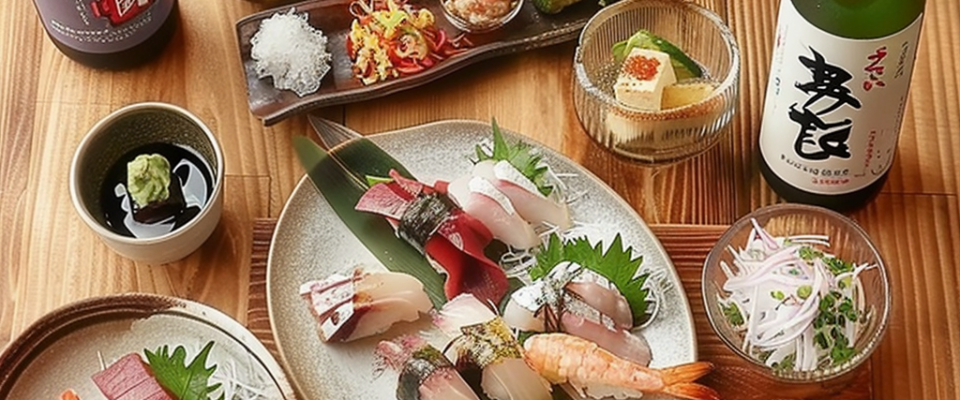Japanese cuisine is a unique fusion of exquisite flavors, graceful aesthetics and deep traditions. The Land of the Rising Sun is famous not only for its technological achievements, but also for its rich cultural heritage, in which cooking plays an important role. Japanese cuisine attracts the attention of gourmets from all over the world with its sophistication, delicious dishes and unique cooking techniques.
History of Japanese cuisine
Japanese cuisine has a history of thousands of years of development, during which it has undergone significant changes influenced by various factors, including geography, climate, cultural exchanges and religious traditions.
Initially, Japanese cuisine was heavily dependent on the country’s natural resources, mainly fish, seafood, rice and vegetables.Situated on an archipelago, Japan has always been surrounded by sea, making fish the main source of food for its population. This led to the development of unique fish preparation methods such as sushi and sashimi, which are still among the most popular dishes in Japanese cuisine today.
Over time, Japan’s culinary arts have also been influenced by neighboring countries, including China and Korea, which have contributed a variety of ingredients, cooking methods, and flavor preferences.An important part of the development of Japanese cuisine was the introduction of rice into the daily diet, which led to the formation of such traditional dishes as sushi, maki and ramen.
Basic principles of Japanese cuisine
Japanese cuisine is distinguished by its unique principles, which determine both the choice of ingredients and methods of preparing dishes:
- Seasonality and use of fresh products: One of the main principles of Japanese cuisine is the use of seasonal and fresh ingredients. The Japanese believe that this is the only way to achieve the best taste and preserve the beneficial properties of the ingredients.
- Unique cooking methods: Japanese cuisine is famous for its unique cooking methods such as sushi, sashimi, ramen and tempura. These methods highlight the natural taste of the ingredients and preserve their beneficial properties.
- The importance of aesthetics and presentation of dishes: In Japanese cuisine, much attention is paid not only to the taste, but also to the aesthetics of the dishes. Cooking and serving food is a real art, and the beauty of the food is of great importance.
Main ingredients and their role
Japanese cuisine has several key ingredients that play an important role in shaping its flavor and character:
- Fish and seafood: Fish is one of the main sources of protein in the Japanese diet. It is used to prepare sushi, sashimi, ramen and many other dishes. Seafood such as shrimp, oysters and mussels are also widely used in Japanese cuisine.
- Rice and its varieties: Rice is considered the basis of Japanese cuisine. It is consumed at almost every meal and is the main source of carbohydrates. There are many varieties of rice grown in Japan, each with its own unique flavor and texture.
- Seaweed (nori, wakame): Seaweed is an important ingredient in Japanese cuisine. They are used for making sushi, rolls, soups and salads. Nori and wakame contain many useful substances and add a characteristic taste and aroma to dishes.
- Sauces and spices (soy sauce, wasabi, ginger): Sauces and spices play an important role in preparing Japanese dishes. Soy sauce is the main seasoning and adds a salty flavor to dishes. Wasabi and ginger are used as additional spicy seasonings that add heat and flavor to dishes.
Traditional Japanese dishes
Traditional Japanese cuisine is rich in a variety of dishes, each of which has its own unique history and cooking technique.Among the most famous Japanese dishes are sushi and sashimi – symbols of Japanese cuisine, which are fresh pieces of fish, seafood or vegetables placed on rice. Rolls (maki) are also a popular dish, where the ingredients are wrapped in nori seaweed with rice. Tempura, deep-fried vegetables or thinly battered seafood, and udon and soba, various types of Japanese noodles, are also widely popular. Don’t forget about Japanese soups, such as miso soup and ramen, which serve not only as a delicious lunch, but also as a flavorful morning breakfast. Also worth noting are Japanese sweets such as mochi and dorayaki, which are unique desserts with traditional ingredients such as rice flour and anko (sweet bean paste).
The influence of Japanese cuisine on world cooking
Japanese cuisine has a significant influence on world cuisine, and its influence is becoming more noticeable every year.Sushi and sashimi, for example, have become popular dishes around the world and have become an integral part of many restaurant menus. Various types of rolls are also common outside of Japan and have become the subject of culinary experimentation and creativity. In addition, Japanese spices and sauces, such as wasabi and soy sauce, are actively used in dishes of various cuisines around the world. The influence of Japanese cuisine is also evident in the introduction of cooking technologies and techniques, such as the use of Japanese knives and cooking techniques. Overall, Japanese cuisine continues to inspire chefs and gourmets around the world, remaining one of the most popular and sought-after culinary destinations.
Japanese cuisine represents a rich heritage of culture and tradition that has attracted the attention and admiration of people around the world. Its unique principles, variety of dishes and influence on world cooking make it one of the most interesting and significant culinary trends. Exploring and studying Japanese cuisine allows us to not only enjoy the taste of exquisite dishes, but also immerse ourselves in the rich history and culture of this fantastic country.
The core principles of Japanese cuisine include seasonality and the use of fresh ingredients, unique cooking methods, and considerable attention to the aesthetics and presentation of dishes.
Japanese cuisine has had a significant influence on world cuisine, introducing dishes such as sushi and sashimi to restaurant menus around the world, as well as introducing its technologies and cooking techniques into the culinary practices of other countries.

